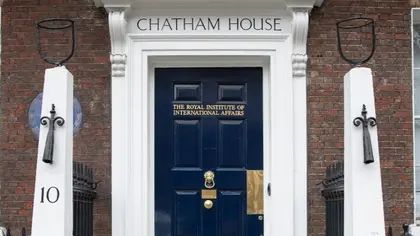Chatham House researchers on Thursday gave their views on what key topics would be discussed during the forthcoming NATO leaders’ summit to be held in Vilnius, Lithuania on July 11-12.
The on-line briefing included short overviews from the Chatham House representatives followed by a Q&A session with journalists, the content of which is summarized below.
JOIN US ON TELEGRAM
Follow our coverage of the war on the @Kyivpost_official.
The following researchers spoke:
· Stuart Coles, Head of Media, Communications and Publishing;
· Alice Billon-Galland, Research Fellow, Europe Program;
· Orysia Lutsevych, Deputy Director, Russia and Eurasia Program;
· Jamie Shea, Associate Fellow, International Security Program;
· Galip Dalay, Associate Fellow, Middle East and North Africa Program
Agenda for the Vilnius summit
The summit was originally intended to be a review of the implementation of the decisions taken at the 2022 meeting in Madrid which had laid out a new forward-based Strategic Concept based on deterrence and defense of NATO members.
But with the ongoing war in Ukraine this year’s meeting would concentrate more on strategic issues, which would include:
· Continued support to Ukraine;
· NATO’s forward defense posture including increased permanent deployments;

Blinken in Brussels as Trump Win Raises Alarm Over Ukraine
· Regional defense plans;
· Protection of infrastructure including under-sea facilities;
· NATO’s Indo-Pacific partners: Australia, Japan, New Zealand, and South Korea;
· The NATO relationship with China and review of the China/Russia relationship.
It was also likely that there would be discussion on trans-Atlantic burden sharing with the need for greater European focus on budgets and the need to develop European military industrial capabilities in light of the lessons learned from the war in Ukraine.
Ukraine – way forward
NATO officials have realized that the summit must transmit a clear way forward for Ukraine membership. The ambiguity created by the 2008 Bucharest declaration of “membership sometime” must be overcome, as this contributed to Russia’s invasions of both Georgia and Ukraine, i.e. before the Article 5 protection kicked-in.
It is probable that sufficient progress has been made in this area to satisfy Ukraine’s demands and position on future membership.
It was commented on that France had now joined the Baltic and Central/European nations were demanding that the pathway should exclude a Mine Action Plan (MAP) as it had done for Finland and Sweden.
The inclusion of Ukraine would now be an asset to the Alliance as a well-trained, well-equipped battle-hardened member and would signal that NATO had reasserted its capability to deter aggression, which had been lost in the last few years.
The discussion over the provision of modern aircraft to Ukraine continues to cause divisions between allies. Recently Turkey, which is one of the major users of the US-made F-16 fighter aircraft, has put its weight behind calls to the US to free up the aircraft.
NATO leadership
The fact that a decision had been made to extend Jens Stoltenberg as Secretary General for a further year has meant the summit could avoid the often, vicious, wrangling that had accompanied previous leadership changes.
What was particularly heartening was the personal relationship he had developed with President Erdogan of Turkey. There is a meeting with Turkey and Sweden on July 6, where it is hoped some progress will be made for acceptance of the Nordic country’s accession.
Stoltenberg has been instrumental in not only pressurizing members to meet their agreed budget levels but has ensured that under the new concept each of the allies has been given clear responsibilities in terms of tasks, troop strengths, equipment and mobilization times. These will be fully tested in the coming months and years.
It is also at Stoltenberg’s urging that the United States European Command has agreed to have overall command responsibility for forces deployed to Eastern and Central Europe.
It is likely that the leadership issue will challenge the Alliance over the coming months as lobbying has already begun concerning the nationality of the next sec gen, the need for a woman to be considered and whether the status of the post demands a former prime minister or similar experience.
Equipment enhancements
The war in Ukraine has been an eye opener for many NATO members, many of whom thought the days of a large-scale, ground-based conventional war had passed. As a result, the following key equipment developments and enhancements have been identified:
· Need to modernize armored forces including tanks and infantry fighting vehicles;
· Increase in air and missile defenses, both ground and air-based;
· The need for longer-range artillery than currently held;
· The need for better communication and data integration both in the field and between nations;
· Improved troop and logistics mobilization and deployment.
Miscellaneous
Efforts are being made to improve cooperation and coordination between Turkey and Greece in order to address the growing threat from Russian presence in the eastern Mediterranean. It is likely that there will be bi-lateral meetings between the leaders of the two nations in Vilnius.
The change in France’s posture over the last few weeks is considered decisive as an indication that Europe must take a greater leadership role which, when combined with Poland’s decision to raise its defense budget to 4%, compared with the 2% obligation as an important step change in the Euro-Atlantic effort share.
When asked by Kyiv Post whether or not there are red lines in Russian actions such as the Khakova dam destruction, threats against the Zaporizhzhia nuclear power plant and suspected use of chemical weapons the Chatham House interlocutors were unable to directly answer.
They suggested that as Putin pushes ever more outrageous actions the support for Ukraine and enhancements in military aid would surely follow. It was also clear that both the US and China had given strong warnings to Russia that the use of nuclear weapons was totally unacceptable and would result in strong responses.
You can also highlight the text and press Ctrl + Enter






